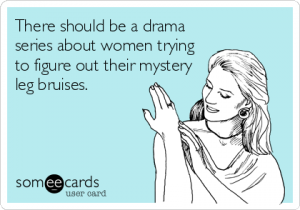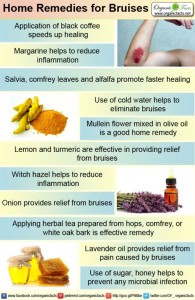When’s the last time you had a bruise? Can you think of the first thing you did when you saw it? Chances are, you poked it to see if it hurt. We’re all guilty of doing this, whether we are aware of it or not. Personally, I am a very clumsy person, which results in the appearance of bruises all over my body. I would wake up and notice a bright red or purple bump on my arm and leg and think, “God, Olivia. Stop bumping into things!”. But of course, my first instinct is to touch it and see if it hurts. 99% of the time, it does. Why do we touch/poke our bruises? What (if anything at all) triggers our brain to test our own pain? It all starts with the bruise itself.
According to Health, bruises are primarily caused by the rupturing of blood vessels, which leak blood out, forming dark red and purple marks on the affected skin. The intensity of the bruise relies on the intensity of the blow itself; the greater the blow, the darker the bruise. Additionally, the size of the bruise is directly correlated with the intensity of the blow and damage to the skin. Some people, according to Web MD, are more prone to getting bruises than others. One factor is age, which means that older people are more likely to get bruises on their body. The protective layer of the skin is slowly diminishing, which makes blood vessels all the more vulnerable to harm. Another variable that makes people more susceptible to bruises is medication, which can increase the risk of bruising. Side effects of the medication may result in weakening of the skin, which increases the harm from blows to the skin. For those sun-tan lovers, skin is dramatically weakened through the harsh effects of the sun’s X-rays. Not only does the sun do harm to the skin, but it increases the risk of skin cancer.
Wonderopolis describes the stages of a bruise. First, the initial popping of the blood vessels in the skin will cause a bright red or purple discoloration on the skin. The size of the bruise is dependent on the intensity of the blow itself. The body is able to metabolize and regenerate after a couple of weeks. Throughout the process, the bruise may turn several shades of green or yellow. Eventually, near the end of the healing process, the bruise may turn a darkish purple (could also be near-black) color.
Now the real question: why are we prompted to touch our bruises when we see them? Zocdoc explains that there are pain receptors in both the skin and in the brain. When we obtain bruises, the pain receptors in the skin are heightened and responsive to touch, vibration, and movement. The pain receptors directly in the muscle and skin are primarily geared towards feeling sensations (touch, vibrations, and light). Our instinctive response to touch our bruises is fueled by the stimulation of the nerves in our muscle and skin. Massaging the area of the bruise acts to distract the abundant pain receptors, which is transmitted to the brain. The brain no longer recognizes the painful aspect of the ruptured blood vessels, but pays closer attention to the alternative sensations.
So, the next time you get a bruise, what should you do? Poke it, of course. But if you’re looking for a remedy that will actually render useful, check out the following tips from Readers Digest:
-Use Ice (apply directly on the affected area for about 10-15 minutes). Reapply several times, alternating between putting the ice on and taking it off.
-Use Heat (apply directly on the affected area for about 10-15 minutes). Reapply several times, alternating between putting the hot compress on and off.
-Use Vinegar (encourages bloodflow)
-Elevate the affected area; If the bruise is on your leg, prop your leg up to encourage blood flow and stimulation
-Check out the above picture for some handy home-remedies that will aid the healing process of the bruise
REMEMBER: If a bruise persists for more than two weeks, contact a health professional immediately. Always better to be safe than sorry!




I always wake up with at least three mystery bruises I gave myself sometime during the previous day. I actually found quite a curious one close to my armpit just a few days ago… I am extremely pale, so I am always bruised! Like you, I am really clumsy and am always knocking into things and accidentally giving myself a plethora of ugly purple spots.
I never really thought about why I always poke my bruises. I think it was just always that I was curious to see if they still hurt! I didn’t really understand from your post why we like to touch them though. I understood that the skin around the bruise can feel heightened levels of touch and such, but am still confused. Do we touch them to distract our body from the pain? I wonder if there is some psychological sense behind this incessant need to poke as well. Here is a link to a website I found that details why some of us might always have alarming mystery bruises! Although I am not especially concerned with my mystery bruises, this website talks about how vitamin deficiency, aging, and weightlifting can create these bruises. I wonder if bruises caused by different reasons hurt more or less, for example, would poking a bruise from weight lifting hurt more than poking a bruise formed from a vitamin deficiency?
-Dana
Hey Olivia! Good post, but I would definitely try to find a study related to poking bruises and how that affects how a bruise heals. Relate your topic back to class by finding a study, finding the alternate hypothesis and null hypothesis, and testing it. When I was in middle school during football season, I would always have bruises all over my arms, so much so that the school called my mom to see what happened. I would always poke them to see if they still hurt. Here’s a good video that shows why a bruise changes color.
https://www.youtube.com/watch?v=3x1yhVEDkNw